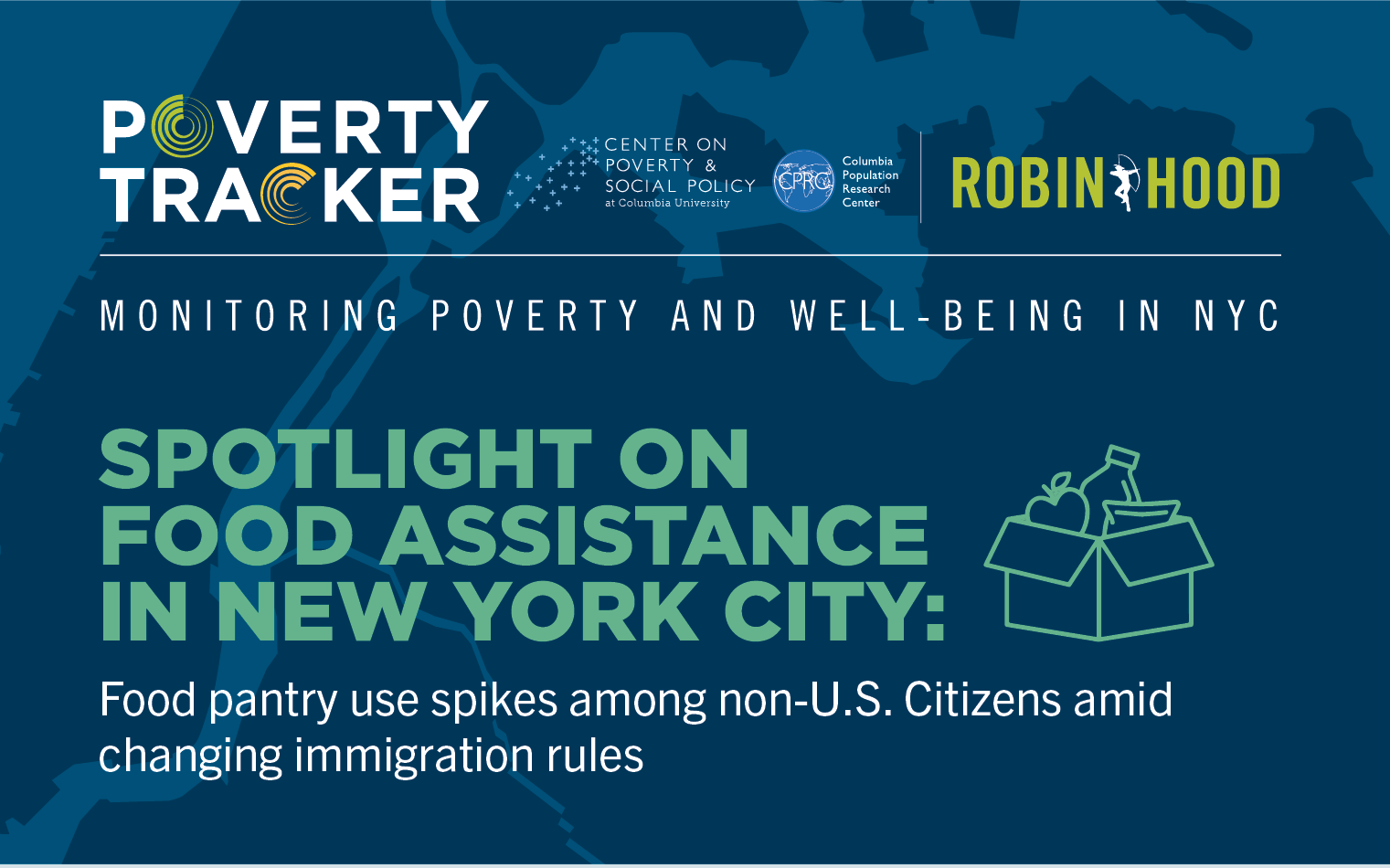Nov 17, 2022 Press Release
Robin Hood Poverty Tracker Report Documents a Rise in Food Pantry Use Among Non-citizen New Yorkers in the Wake of Federal Policy Change
Report Demonstrates “Chilling Effect” Among Non-Citizens SNAP Usage, Increased Usage of Food Pantries

NEW YORK, November 17, 2022 — Today, Robin Hood, in collaboration with Columbia University’s Center on Poverty and Social Policy and the Columbia Population Research Center, released its latest Poverty Tracker report—a spotlight on an often overlooked area of need in New York City: food insecurity among low-income, non-citizen New Yorkers. The report, “Spotlight: Food Assistance in New York City,” shows that pantry usage among non-citizens increased amid Trump-era immigration rule changes, while SNAP usage decreased. The Poverty Tracker documents a significant increase in non-citizens using emergency food services—a trend that will likely intensify as New York welcomes new waves of migrants and asylum seekers.
In 2018, the Trump administration began discussing a rule change whereby use of SNAP benefits could be used to deny citizenship applications. Even after the Biden administration later reversed this ruling, non-citizens may be unaware of its reversal or afraid to use benefits. The report shows a “chilling effect,” where eligible, low-income, non-citizens underutilize SNAP for fear of its impact on their citizenship application, turning to pantries and other private food providers instead.
“The current asylum-seeker and migrant crisis is yet another reminder about the fragility of our safety net systems in New York City, particularly for non-citizens,” said Richard R. Buery, Jr., CEO of Robin Hood. “Food pantries and shelters are facing increasing demands as thousands of individuals and families arrive in New York City without legal authorization to work and the means to cover basic needs like food and housing. The City and State can make non-citizens eligible for more public benefits, including the City’s rental assistance program CityFHEPS, and they can strengthen efforts to raise awareness about eligibility guidelines for benefits like SNAP, which are available to certain non-citizens, to increase enrollment and reduce hardship.”
Key findings from the report include:
- Preliminary data shows in 2021, three out of every ten adult New Yorkers faced food hardship — defined as sometimes or often running out of food or worrying food would run out without money to buy more. In 2021, 30% of New York City adults faced food hardship, and 6% faced severe food hardship.
- City government data shows decreased SNAP enrollment among non-citizens amid rule changes about public charge: As the Trump administration began discussing changing immigration laws to include SNAP among the list of benefits that could deem someone a “public charge” (a non-citizen who receives government benefits), SNAP enrollment among non-U.S. citizens in NYC decreased by 6% compared to 2017—double the decrease among citizens (3%). This downward trend continued between 2018 and 2019, with an 11% drop in SNAP enrollment among non-citizens compared with a 3% decline in enrollment among citizens.
- Non-citizens turn to food pantries: After the Trump administration began moving to include SNAP in the definition of benefits that could deem someone a “public charge,” food pantry use among low-income, non-citizen New Yorkers increased nearly 80%, nearly doubling from 17% to 30% compared to a 30% increase in food pantry use among low-income citizen adults, from 18% to 24%.
“In the wake of COVID, food pantries have played an outsized role in helping New Yorkers afford food. Compounding the challenges brought on by the pandemic, anti-immigration rhetoric and policy have had a chilling effect on people’s willingness to engage with the public food assistance system. Our Poverty Tracker data show that the post-covid increases in pantry use have been especially pronounced among non-citizen New Yorkers who have been pushed away from public programs meant to ensure families and children have enough to eat. These findings also highlight how food pantries provide a safe haven for non-citizens who are striving for a permanent citizenship status,” said Matt Maury, senior research analyst at Columbia University, Center on Poverty and Social Policy.
During the pandemic, Robin Hood provided nearly $9 million in aid to soup kitchens, food pantries and other emergency food services, including 10 grants funded through Robin Hood’s core grant program each averaging about $527,000 and more than 90 smaller grants administered through the Robin Hood Relief Fund. Currently, Robin Hood is investing more than $4.1 million in emergency food services and food pantries across New York City’s five boroughs. Select grantees include, City Harvest, River Fund, POTS (Part of the Solution), and the West Side Campaign Against Hunger.
Since 2012, the Poverty Tracker has surveyed a representative sample of 3,000 New York households every three months, providing critical information on the dynamics of poverty and other forms of disadvantage in the city while tracking data on employment, assets and debts, and health. The Poverty Tracker has monitored the impacts that COVID-19 and the related economic downturn have had on life in New York City since the onset of the pandemic.
Read the full report HERE.